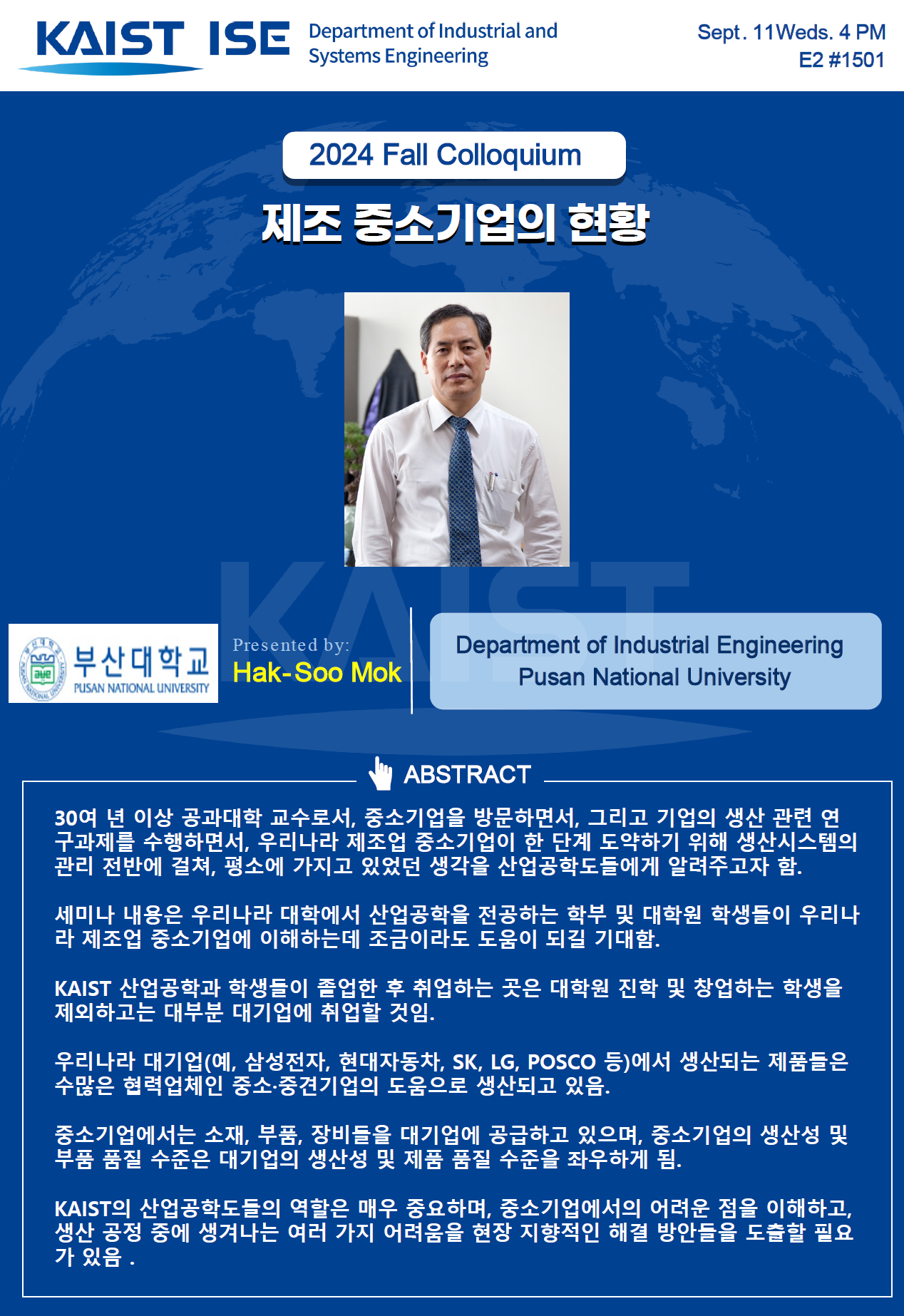뉴스 및 공지사항
- 관리자
- 2024.09.09
- 645
- 첨부파일
30여 년 이상 공과대학 교수로서, 중소기업을 방문하면서, 그리고 기업의 생산 관련 연구과제를 수행하면서, 우리나라 제조업 중소기업이 한 단계 도약하기 위해 생산시스템의 관리 전반에 걸쳐, 평소에 가지고 있었던 생각을 산업공학도들에게 알려주고자 함.
세미나 내용은 우리나라 대학에서 산업공학을 전공하는 학부 및 대학원 학생들이 우리나라 제조업 중소기업에 이해하는데 조금이라도 도움이 되길 기대함.
KAIST 산업공학과 학생들이 졸업한 후 취업하는 곳은 대학원 진학 및 창업하는 학생을 제외하고는 대부분 대기업에 취업할 것임.
우리나라 대기업(예, 삼성전자, 현대자동차, SK, LG, POSCO 등)에서 생산되는 제품들은 수많은 협력업체인 중소·중견기업의 도움으로 생산되고 있음.
중소기업에서는 소재, 부품, 장비들을 대기업에 공급하고 있으며, 중소기업의 생산성 및 부품 품질 수준은 대기업의 생산성 및 제품 품질 수준을 좌우하게 됨.
KAIST의 산업공학도들의 역할은 매우 중요하며, 중소기업에서의 어려운 점을 이해하고, 생산 공정 중에 생겨나는 여러 가지 어려움을 현장 지향적인 해결 방안들을 도출할 필요가 있음.
------------------------------------------------------------------------------------------------------------------------------------------------------------------------------------
# Location: Room 1501 in E2 building
# Presenter: Professor Emeritus Hak-Soo, Mok , Pusan National University
For over 30 years as a professor in the College of Engineering, I have visited small and medium-sized enterprises (SMEs) and conducted research projects related to production for various companies. Through these experiences, I have developed thoughts on improving the overall management of production systems to help South Korea's manufacturing SMEs take a leap forward. I wish to share these insights with students of industrial engineering.
The seminar aims to provide undergraduate and graduate students majoring in industrial engineering at universities in Korea with a better understanding of the challenges faced by the country's manufacturing SMEs, hoping it will offer some level of assistance.
Upon graduation, most students from KAIST's Department of Industrial Engineering, except those who pursue further studies or start their own businesses, are likely to find employment in large corporations.
The products manufactured by South Korea's large corporations (e.g., Samsung Electronics, Hyundai Motor, SK, LG, POSCO) rely heavily on the support of numerous SMEs and mid-sized companies that act as suppliers. These SMEs provide materials, components, and equipment to large corporations, and the productivity and quality level of the components produced by these SMEs directly impact the productivity and product quality of the large corporations.
The role of industrial engineering students at KAIST is therefore critical. It is essential for them to understand the difficulties faced by SMEs and to derive practical, field-oriented solutions to the various challenges that arise during production processes.


